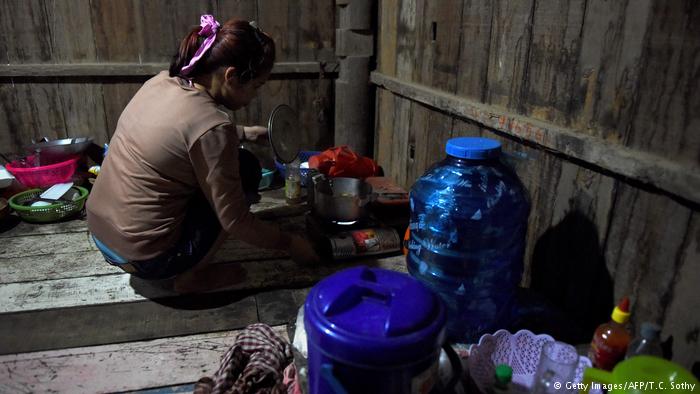Prostitution- legal or illegal?
 Eva-Marree, 27, a Swedish sex workers’ rights activist was murdered earlier this month by her ex-boyfriend when she went to visit her children. Marree had lost custody of her children because she is said to have “romanticized prostitution.” The Swedish authorities allegedly denied her custody of children because of her profession. Prostitution is illegal in Sweden. Sex workers continue to be stigmatized by the society and have few platforms to voice their problems and concerns. They are barred from state welfare benefits and any kind of protection if they choose to continue their work as sex workers.A member of the Swedish organization for sex workers, Rose Alliance, Eva-Maree, known as Petite Jasmine, strongly advocated for the rights of sex workers. She fought a long battle to win back the rights to visit her children.
Eva-Marree, 27, a Swedish sex workers’ rights activist was murdered earlier this month by her ex-boyfriend when she went to visit her children. Marree had lost custody of her children because she is said to have “romanticized prostitution.” The Swedish authorities allegedly denied her custody of children because of her profession. Prostitution is illegal in Sweden. Sex workers continue to be stigmatized by the society and have few platforms to voice their problems and concerns. They are barred from state welfare benefits and any kind of protection if they choose to continue their work as sex workers.A member of the Swedish organization for sex workers, Rose Alliance, Eva-Maree, known as Petite Jasmine, strongly advocated for the rights of sex workers. She fought a long battle to win back the rights to visit her children.
Rose Alliance issued a statement on her death. “The children were staying with their father regardless of him being abusive towards Jasmine. They told her she didn’t know what was good for her and that she was “romanticizing” prostitution, they said she lacked insight and didn’t realize sex work was a form of self-harm.”
Her blog njutningtillsalu.com (Pleasure For Sale) and tweets criticized the Swedish attitude towards prostitution.
Please make a loop hole in the law that makes clients able to report about trafficking without being charged for buying sex.
— Petite Jasmine (@JasminePetite) May 22, 2013
The Swedish Prostitution Policy
According to Wikipedia, the laws on prostitution in Sweden make it illegal to buy sexual services, but not to sell them. Pimping, procuring and operating a brothel are also illegal. The criminalization of the purchase, but not selling, of sex was unique when first enacted in 1999, but since then Norway and Iceland have adopted similar legislation, both in 2009.
Known as the “Swedish model” or “Nordic Model,” the bill was intended to fight violence against women by criminalizing men who purchased sex and to curb the market demand, hence pushing down prostitution and trafficking. The law continues to remain hotly debated in the country.
Petra Östergren is a writer and social commentator specializing on gender politics and prostitution issues. In her blog petraostergren.com, she highlights the problems of sex workers in Sweden. The law against procurement in Sweden renders it illegal to work indoors, work with others, to profit from the sexual labour of others and advertise.
Petra’s interviews with sex workers revealed that while they are relieved that the law protects them from exploitative pimps, they are discriminated, as sex workers no longer have the right to a reasonable work environment, are not allowed to work collectively or advertise or open a business. Sex workers are not allowed to legally rent premises. They are forced to make quick deals, because their client is afraid of being caught.
The clients cannot be assessed in advance and any mishaps with a particular client cannot be shared with other colleagues putting them at the risk of being mistreated. As a result, they lack safety and support and are scared to work alone. They cannot have a family, as it is illegal to receive any of a sex worker’s income. They are seen as unfit parents and can lose custody of their children if it emerges that they sell sex.
Lawmakers in Sweden seem to have turned a deaf ear to the problems of the sex workers unless they conform to the law and become victims and seek the help of social services. Petite Jasmine was reportedly stripped of children, her dignity and her life because she chose to be a sex worker.
In the light of her recent murder, sex workers across the globe have come together to draw attention to their situation. They do not have welfare benefits and have to risk their lives working underground. Vehement criticism has come to the forefront about whether prostitution can really be brought down by making it illegal.
In a liberal world, prostitution would be just another business where an adult provides sexual services to another adult who is willing to pay for it. Children and non-consenting adults pushed into the trade need protection but sex workers cannot be stigmatized for their choice of profession and cannot be stripped off their benefits.
Instead of curbing individual choice, I believe that governments need to work towards combating the bigger problem of punishing those who benefit from exploiting sex workers rather than victimizing the sex workers themselves.
Christian, who is dating a sex worker, aptly writes in his blog christianbvega.blogspot.ca, “Sex workers don’t sell their bodies; they sell an experience to lonely guys that need it. The problem isn’t sex workers, but the culture that degrades and dehumanizes them. Changing that culture begins with changing ourselves. Go for it.”
Author: Roma Rajpal
Editor: Manasi Gopalakrishnan
Roma Rajpal is an Indian journalist and Blogger currently based in Bonn. She can be followed on Twitter @romarajpal






